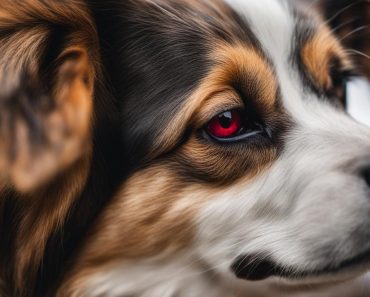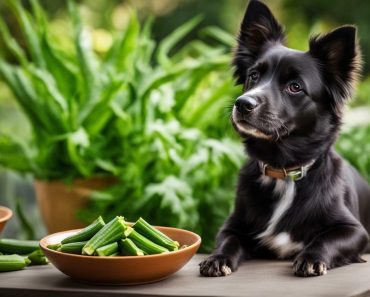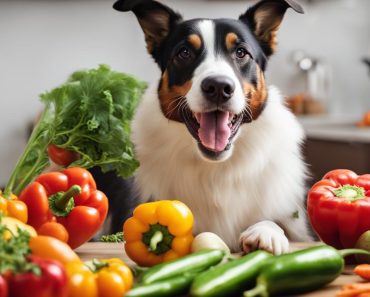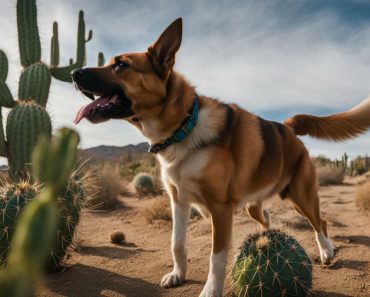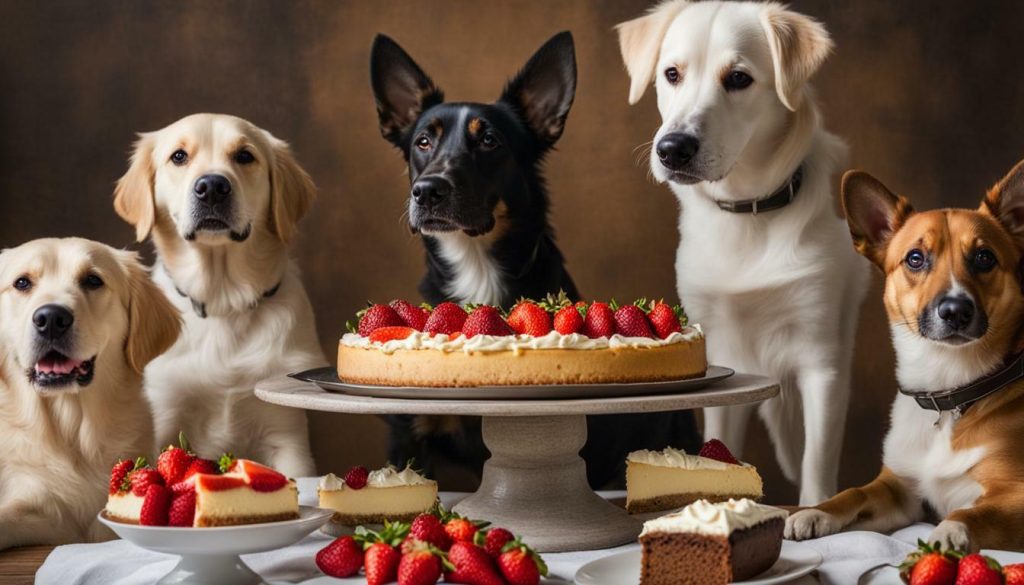 Many dog owners wonder if it is safe to feed their furry companions cheesecake. While dogs can technically eat cheesecake, it is important to understand the potential risks and consider the nutritional content before indulging them. In this section, we will explore the facts surrounding dogs and cheesecake to help you make an informed decision about whether or not to treat your pup to this creamy dessert.
Many dog owners wonder if it is safe to feed their furry companions cheesecake. While dogs can technically eat cheesecake, it is important to understand the potential risks and consider the nutritional content before indulging them. In this section, we will explore the facts surrounding dogs and cheesecake to help you make an informed decision about whether or not to treat your pup to this creamy dessert.
- Cheesecake is not recommended as a regular treat for dogs due to its high sugar, fat, and dairy content.
- Dogs that are lactose intolerant may experience digestive issues if they consume cheesecake.
- It is important to avoid toxic ingredients like chocolate, raisins, grapes, and nuts when giving dogs cheesecake.
- There are alternative cheesecake recipes available that use dog-safe ingredients such as bananas, peanut butter, and blueberries.
- Consulting with a veterinarian is essential before introducing any new food into your dog’s diet, including cheesecake.
Understanding the Potential Risks
While dogs can technically eat cheesecake, it’s important to understand the potential risks involved. Cheesecake is a dessert that is high in sugar, fats, and dairy content, which can have adverse effects on a dog’s health. Dogs that are lactose intolerant may experience digestive issues such as diarrhea, gas, and bloating if they consume cheesecake.
Feeding cheesecake to dogs regularly can lead to weight gain and obesity, which can increase the risk of developing health problems such as diabetes, joint issues, and heart disease. The high sugar content in cheesecake can also contribute to dental problems, including tooth decay and gum disease.
Furthermore, the crust of cheesecake and the addition of ice cream should be given to dogs cautiously. The crust may contain ingredients like chocolate, raisins, grapes, or nuts, which are toxic to dogs and can cause serious health complications. Ice cream often contains added sugars, artificial flavors, and other ingredients that can be harmful to dogs.
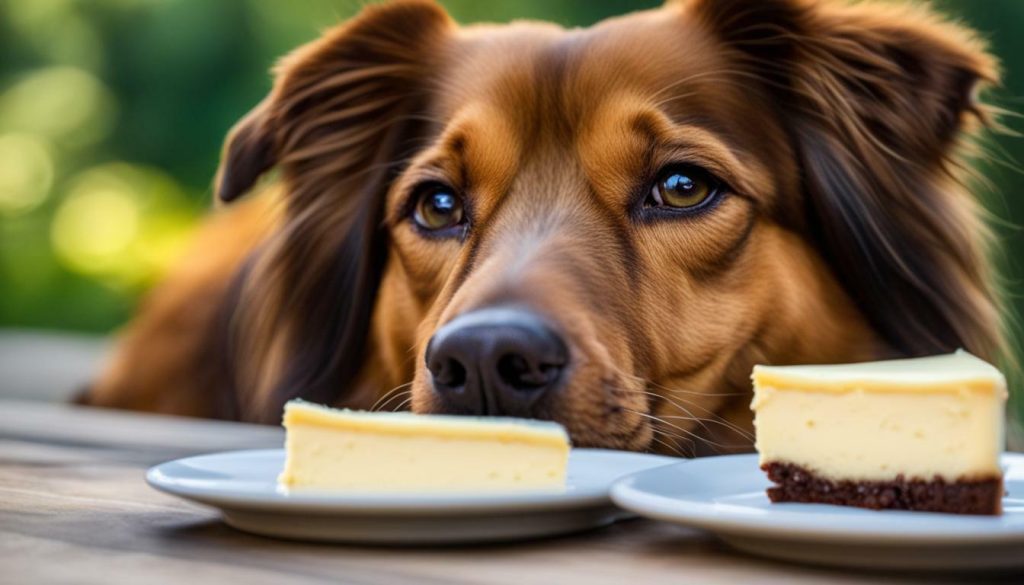
In summary, while dogs can eat cheesecake, it is not recommended to include it as a regular treat in their diet. It is important to prioritize their overall health and provide them with a balanced diet that meets their nutritional needs. If you want to treat your dog occasionally, there are alternative cheesecake recipes available that use dog-safe ingredients like banana, peanut butter, or blueberries. However, always consult with your veterinarian before introducing any new food into your dog’s diet to ensure it is safe and suitable for their specific health conditions.
Why Cheesecake is Not Recommended for Dogs
Cheesecake may be a delight for humans, but it’s not an ideal treat for our canine companions. While dogs can technically consume cheesecake, it is not recommended to include it as a regular part of their diet. Cheesecake is typically high in sugar, fats, and dairy, which can be problematic for dogs, especially those that are lactose intolerant. This indulgent dessert can lead to various health issues, including weight gain, digestive problems, and even pancreatitis in some cases.
One of the main reasons why cheesecake is not recommended for dogs is its high sugar content. Dogs have different nutritional needs than humans, and too much sugar can put a strain on their bodies. Consuming excessive amounts of sugar can contribute to obesity, dental issues, and even diabetes in dogs. It’s important to remember that even a small slice of cheesecake contains a significant amount of sugar, which can be overwhelming for a dog’s system.
In addition to the high sugar content, cheesecake is also rich in fats, which can be difficult for dogs to digest. Dogs typically require a diet that is lower in fat to maintain their overall health. Consuming large amounts of fat can lead to diarrhea, upset stomach, and even more serious conditions such as pancreatitis. Additionally, the dairy content in cheesecake can pose a problem for dogs that are lactose intolerant. While some dogs can tolerate small amounts of dairy, others may experience digestive issues such as bloating, gas, and diarrhea.
| Cheesecake Nutritional Content | Per 100g |
|---|---|
| Calories | 321 kcal |
| Protein | 6.2 g |
| Fat | 21.9 g |
| Carbohydrates | 23.6 g |
| Sugar | 17.2 g |
While it may be tempting to share a slice of cheesecake with your furry friend, it is best to resist the urge. Instead, there are plenty of other dog-friendly treat options available that can satisfy their cravings without putting their health at risk. Consider homemade treats using ingredients like banana, peanut butter, and blueberries, which are safe and healthier alternatives for dogs. Remember, it’s always crucial to consult with a veterinarian before introducing any new food into your dog’s diet, including cheesecake, to ensure it aligns with their specific dietary needs and health conditions.
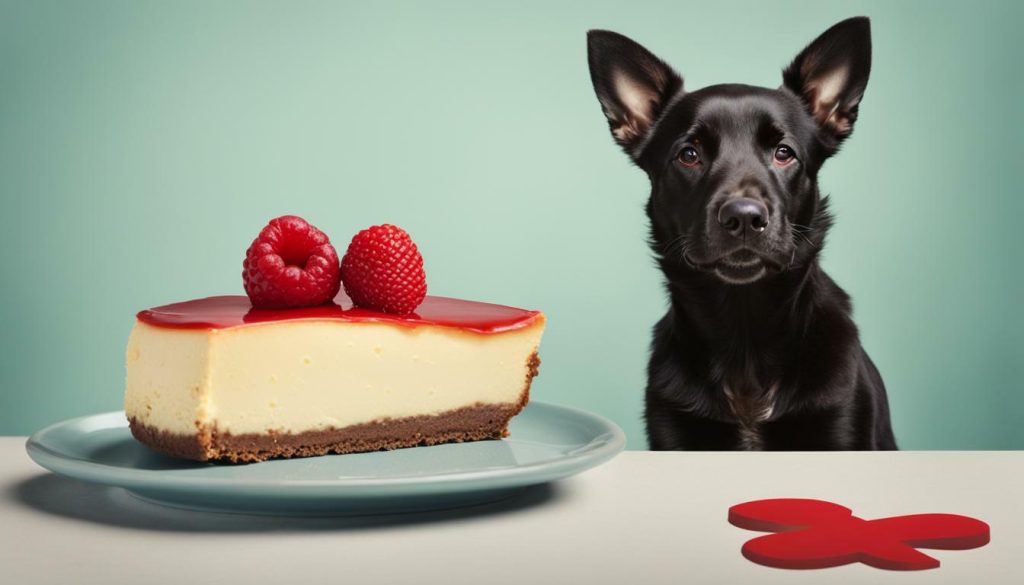
Cheesecake is high in sugar, fats, and dairy, which can have negative effects on a dog’s well-being. While dogs can consume small amounts of these ingredients, an excessive intake can lead to weight gain, digestive issues, and even pancreatitis. It is important to remember that dogs have different nutritional needs than humans, and their bodies are not designed to process certain foods in the same way.
When it comes to cheesecake, the sugar content is a major concern. Dogs do not need sugar in their diet, and too much can lead to obesity, dental problems, and an increased risk of developing diabetes. Additionally, the high fat content in cheesecake can strain a dog’s digestive system and potentially lead to gastrointestinal upset. Dogs with pancreatitis or other conditions that affect the pancreas should avoid high-fat foods like cheesecake altogether.
The dairy content in cheesecake is another aspect to consider. While some dogs can tolerate small amounts of dairy, many are lactose intolerant and may experience digestive discomfort if they consume cheesecake or other dairy-based products. Symptoms of lactose intolerance in dogs can include gas, diarrhea, and bloating. It is best to err on the side of caution and avoid giving cheesecake to dogs with known lactose intolerance or a history of dairy-related digestive issues.
| Nutritional Content | Amount per Serving |
|---|---|
| Calories | 450 |
| Total Fat | 28g |
| Saturated Fat | 16g |
| Cholesterol | 120mg |
| Sodium | 320mg |
| Total Carbohydrate | 42g |
| Sugars | 32g |
| Protein | 6g |
While it may be tempting to share a small piece of cheesecake with your furry friend, it is important to prioritize their health and well-being. If you want to treat your dog, there are alternative cheesecake recipes specifically designed for dogs that use healthier ingredients like banana, peanut butter, and blueberries. These alternatives can provide a tasty and safe option for your dog to enjoy as an occasional treat.

However, it is always advisable to consult with a veterinarian before introducing any new food into your dog’s diet, including cheesecake or its alternatives. A vet can provide personalized advice tailored to your dog’s specific dietary needs and health conditions, ensuring their overall well-being is protected.
Lactose Intolerance in Dogs
Dogs, like some humans, can be lactose intolerant, making cheesecake a potential digestive challenge for them. Lactose is a sugar found in milk and dairy products, and lactose intolerance occurs when the body lacks the enzyme lactase needed to digest this sugar. Without enough lactase, dogs may experience symptoms such as diarrhea, gas, bloating, and stomach discomfort after consuming dairy products, including cheesecake.
If you suspect that your dog is lactose intolerant, it is best to avoid feeding them cheesecake or any other dairy-based treats. Even small amounts of cheesecake can trigger digestive issues in lactose intolerant dogs. Instead, opt for lactose-free or dairy-free alternatives when it comes to treating your pooch.
Table: Safe and Unsafe Cheesecake Ingredients for Dogs
| Safe Ingredients | Unsafe Ingredients |
|---|---|
| Plain, unsweetened cream cheese | Chocolate |
| Plain, unsweetened Greek yogurt | Raisins |
| Pumpkin puree | Grapes |
| Blueberries | Nuts |
When preparing alternative cheesecake recipes for dogs, you can use safe ingredients like plain, unsweetened cream cheese, Greek yogurt, pumpkin puree, and blueberries. These ingredients provide a similar taste and texture to traditional cheesecake but are safer for canine consumption. Remember to avoid including any unsafe ingredients, as they can be harmful to dogs.
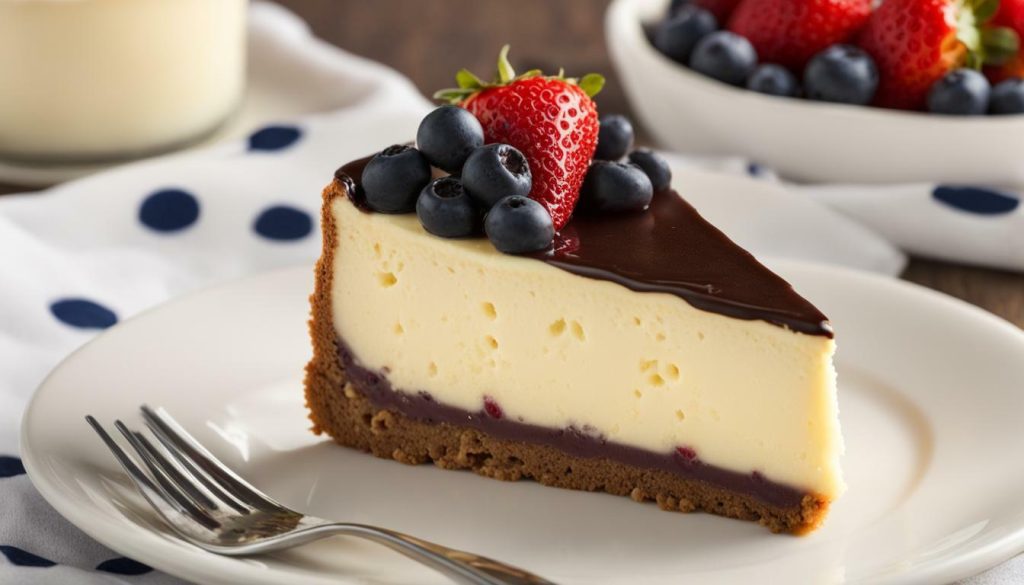
While it may be tempting to share a slice of cheesecake with your furry friend, it’s essential to prioritize their health and well-being. If you have any doubts or concerns about feeding cheesecake to your dog, consult with your veterinarian. They can provide personalized advice based on your dog’s specific dietary needs and health condition, ensuring that you make the best choices for their overall well-being.
Caution with Cheesecake Crust and Ice Cream
While some parts of cheesecake can be given to dogs in moderation, caution should be exercised when it comes to the crust and ice cream. Cheesecake crust often contains ingredients like butter and sugar, which can be harmful to dogs in large amounts. Additionally, some crusts may contain nuts, such as almonds or walnuts, which can be toxic to dogs and cause digestive issues or even more serious health problems.
Ice cream is another popular accompaniment to cheesecake, but it is important to be aware that most ice creams are made with dairy. Dogs, especially those that are lactose intolerant, may have difficulty digesting dairy products and could experience stomach upset, diarrhea, or other digestive issues as a result. Furthermore, some ice creams may contain additional ingredients like chocolate or artificial sweeteners, which can also be toxic to dogs.
To ensure the safety of your furry friend, it is best to avoid giving them cheesecake crust and ice cream altogether. If you still want to treat them to a cheesecake-like experience, there are alternative recipes specifically designed for dogs that use dog-friendly ingredients like peanut butter, banana, or blueberries. These recipes provide a safer and healthier option for indulging your dog’s taste buds without compromising their well-being.
| Unsafe Ingredients for Dogs | Unsafe Effects on Dogs |
|---|---|
| Butter | High fat content can lead to obesity and pancreatitis. |
| Sugar | Can cause tooth decay, weight gain, and other health issues. |
| Nuts (e.g., almonds, walnuts) | Can be toxic to dogs and cause digestive issues. |
| Dairy (e.g., ice cream) | Can lead to digestive problems, especially in lactose-intolerant dogs. |
| Chocolate | Contains theobromine, which is toxic to dogs and can cause various symptoms, including vomiting, diarrhea, and even seizures or death. |
| Raisins and grapes | Can cause kidney failure in dogs, leading to severe health complications. |
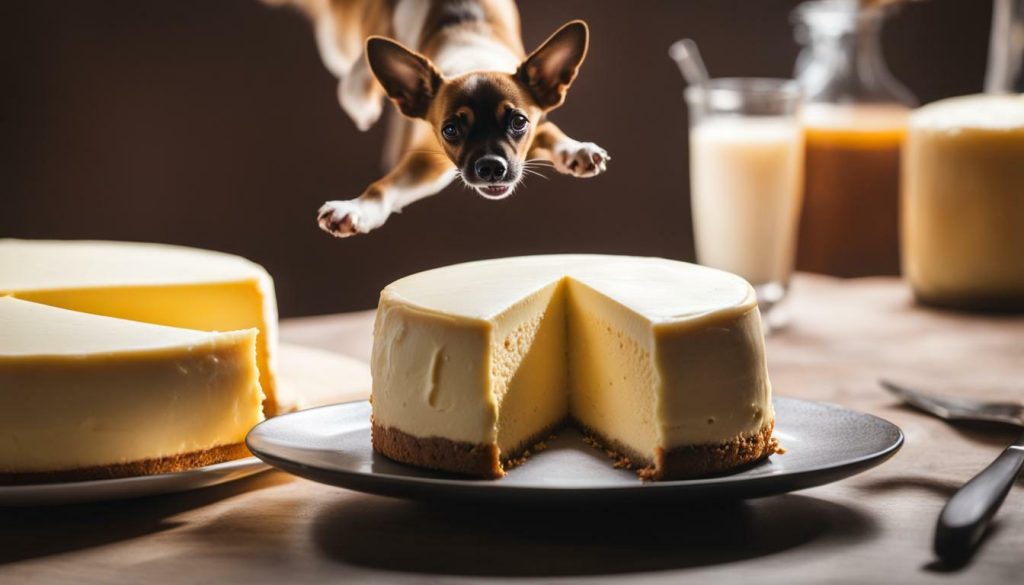
Remember, when it comes to treating your dog, it is essential to prioritize their health and well-being. While the occasional small bite of cheesecake might not cause any harm, it is best to avoid feeding them the crust or ice cream and opt for safer alternatives instead. Always consult with your veterinarian to ensure that any new foods you introduce into your dog’s diet align with their specific dietary needs and health conditions. By making informed choices, you can provide your furry friend with tasty treats that won’t compromise their overall health.
Avoiding Dangerous Ingredients
Certain ingredients commonly found in cheesecake can pose serious health risks for dogs. It is essential to be aware of these ingredients and avoid feeding them to your furry friend. Chocolate, raisins, grapes, and nuts are all toxic to dogs and should never be included in any food, including cheesecake. These ingredients can lead to symptoms ranging from stomach upset and vomiting to more severe issues like kidney failure or even death in some cases.
When it comes to enjoying cheesecake, it’s crucial to prioritize your dog’s health and well-being. While they may be eyeing that luscious slice, it’s important to resist the temptation to share it with them. Dogs have different dietary needs and sensitivities compared to humans, and indulging them with foods like cheesecake can have adverse effects on their overall health.
“Certain ingredients commonly found in cheesecake can pose serious health risks for dogs.”
If you want to treat your dog to something sweet, there are alternative cheesecake recipes specifically designed for canines. These recipes often use dog-friendly ingredients like banana, peanut butter, and blueberries, which are safe for dogs to consume in moderation. It’s always a good idea to consult with your veterinarian before introducing any new food into your dog’s diet, including homemade treats like cheesecake. They can provide guidance based on your dog’s individual dietary needs and health conditions.
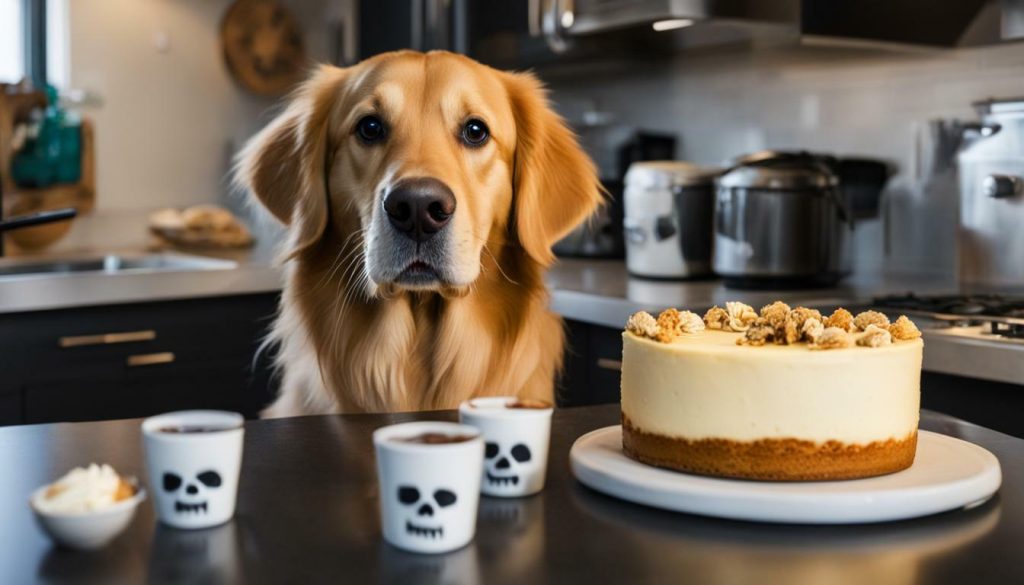
| Dangerous Ingredients | Potential Health Risks |
|---|---|
| Chocolate | Stomach upset, vomiting, increased heart rate, seizures, kidney failure |
| Raisins | Kidney failure, lethargy, loss of appetite, dehydration |
| Grapes | Kidney failure, vomiting, diarrhea, abdominal pain |
| Nuts | Stomach upset, pancreatitis, diarrhea, potential blockage |
Summary:
When it comes to dogs and cheesecake, it’s crucial to prioritize their health and well-being. Certain ingredients commonly found in cheesecake, such as chocolate, raisins, grapes, and nuts, can be toxic and pose serious health risks for dogs. It’s essential to avoid feeding these ingredients to your canine companion.
Instead, consider alternative cheesecake recipes designed for dogs, which use dog-friendly ingredients like banana, peanut butter, and blueberries. Remember to consult with your veterinarian before introducing any new foods into your dog’s diet, ensuring you cater to their specific dietary needs and health conditions.
Alternative Cheesecake Recipes for Dogs
For those who still want to treat their dogs with some cheesecake, there are alternative recipes available. By using dog-safe ingredients, you can create a delicious and safe dessert for your furry friend. Here are a few mouth-watering options:
- Banana Cheesecake Bites: Mash a ripe banana and mix it with a small portion of cream cheese. Form small bite-sized balls using the mixture and refrigerate until firm. These banana cheesecake bites are sure to please your dog’s taste buds while being a healthier alternative to traditional cheesecake.
- Peanut Butter Cheesecake: Combine unsalted peanut butter with non-fat, plain Greek yogurt. Spread the mixture evenly onto a baking dish and freeze until solid. Cut into small cubes and serve as a frozen treat on hot summer days.
- Blueberry Cheesecake Cups: Mix mashed blueberries with low-fat cottage cheese. Pour the mixture into silicone cupcake molds and freeze until set. These bite-sized blueberry cheesecake cups are packed with antioxidants and can be served as a refreshing dessert.
Remember, while these alternative cheesecake recipes are generally safe for dogs, it is important to consider your dog’s specific dietary needs and health conditions. Always consult with a veterinarian before introducing any new food into your dog’s diet. Additionally, these treats should be given in moderation to avoid any potential digestive issues. Treat your furry friend to a special dessert occasionally, but prioritize their overall health and well-being.
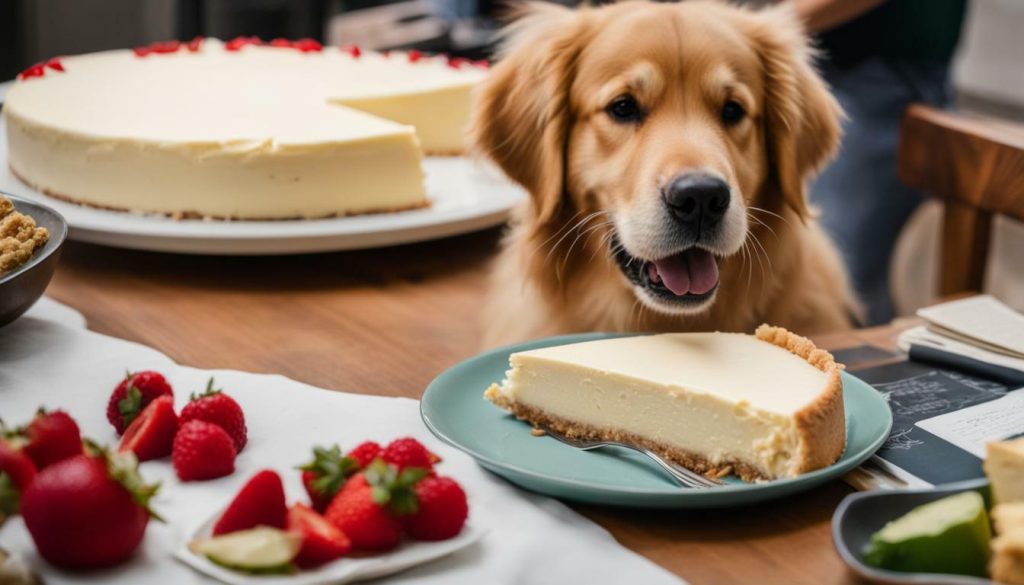
While dogs can eat cheesecake, it is not recommended to feed them traditional cheesecake due to its high sugar, fat, and dairy content. However, there are alternative recipes available that use dog-safe ingredients and provide a safer option for indulging your pet. Banana cheesecake bites, peanut butter cheesecake, and blueberry cheesecake cups are just a few examples of tasty alternatives. Remember to always consult with a vet and consider your dog’s specific needs before introducing any new food into their diet. Treat your dog with love and care, and enjoy making special desserts that are both safe and enjoyable for your furry companion.
| Recipe Name | Ingredients |
|---|---|
| Banana Cheesecake Bites | Ripe banana, cream cheese |
| Peanut Butter Cheesecake | Unsalted peanut butter, non-fat Greek yogurt |
| Blueberry Cheesecake Cups | Blueberries, low-fat cottage cheese |
Consult with a Vet
Before sharing any human food with your dog, it is crucial to seek professional advice. While dogs can eat cheesecake, it is important to consider their specific dietary needs and any underlying health conditions they may have. Consulting with a veterinarian will help ensure that you are making informed decisions regarding your dog’s diet and overall health.
Lactose intolerance is a common issue among dogs, and cheesecake contains dairy products that can be difficult for them to digest. It is essential to understand your dog’s tolerance for lactose before feeding them any dairy-based foods. Some dogs may be able to tolerate small amounts of cheesecake, while others may experience digestive upset or other adverse reactions.
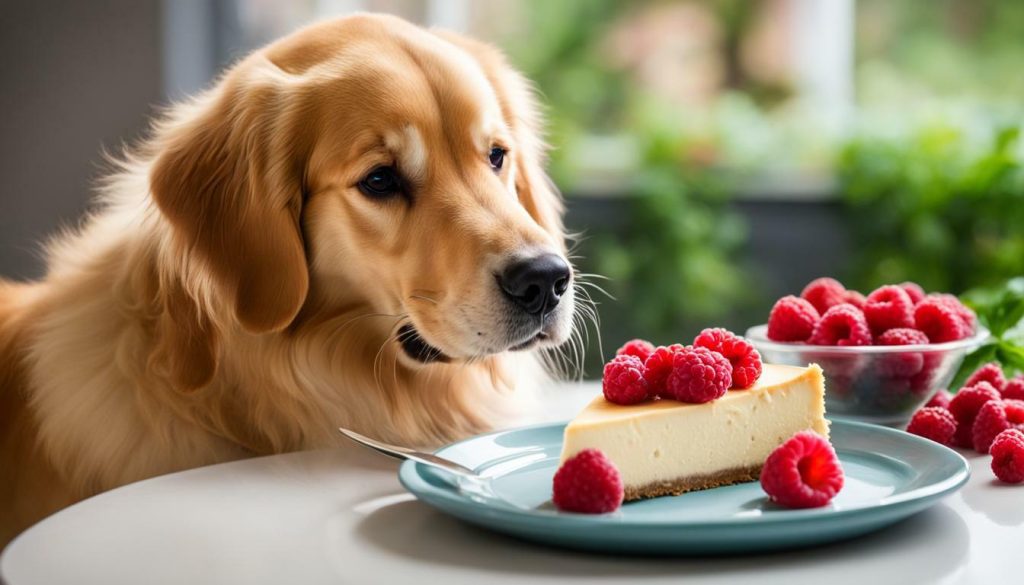
Additionally, cheesecake is typically high in sugar and fats, which can lead to weight gain and other health issues in dogs if consumed regularly. It is important to remember that dogs have different nutritional requirements than humans, and their diets should primarily consist of balanced dog food formulated for their specific needs.
If you are interested in treating your dog to a cheesecake-like dessert, there are alternative recipes available that use dog-friendly ingredients. These recipes often include fruits like blueberries and bananas, which can provide natural sweetness and added nutritional benefits. However, it is always best to consult with a vet before incorporating any new foods into your dog’s diet, even if they are homemade treats.
Table: Potential Risks of Feeding Cheesecake to Dogs
| Risks | Explanation |
|---|---|
| Lactose Intolerance | Dogs with lactose intolerance may experience digestive issues if given cheesecake. |
| Weight Gain | Cheesecake is high in sugar and fats, which can lead to weight gain if consumed regularly. |
| Potential for Toxic Ingredients | Some cheesecake recipes may contain ingredients like chocolate, raisins, grapes, or nuts, which are toxic to dogs. |
In conclusion, while dogs can eat cheesecake in moderation, it is important to consider the potential risks and consult with a veterinarian before introducing any new food into their diet. By seeking professional advice, you can ensure that you are making the best decisions for your dog’s health and well-being.
Conclusion
While dogs can technically have a small amount of cheesecake, it is best to avoid making it a regular part of their diet. Cheesecake is high in sugar, fats, and dairy, which can lead to health issues in dogs, especially those that are lactose intolerant. Consuming large quantities of cheesecake can result in weight gain, digestive problems, and even pancreatitis in dogs.
However, if you still want to treat your furry friend to some cheesecake, it is crucial to exercise caution. Cheesecake crust and ice cream should be given to dogs cautiously, as they can contain potentially harmful ingredients like chocolate, raisins, grapes, and nuts which are toxic to dogs. Always make sure to select a plain cheesecake without any added ingredients that may be harmful to your dog’s health.
For those dog owners who would like to provide their pets with a safe alternative to traditional cheesecake, there are various recipes available that use dog-friendly ingredients such as banana, peanut butter, and blueberries. These alternatives can be a healthier option for treating your dog to a tasty dessert without putting their health at risk. Remember, moderation is key when it comes to introducing any new food into your dog’s diet, including cheesecake or its alternatives.
Before making any changes to your dog’s diet, it is always essential to consult with a veterinarian. They can provide valuable advice tailored to your dog’s specific dietary needs and health conditions. Your vet can guide you on whether it is safe for your dog to consume cheesecake or suggest suitable alternatives that align with their nutritional requirements. By working closely with a professional, you can ensure that your dog’s diet remains balanced and promotes their overall well-being.
FAQ
Can dogs eat cheesecake?
Yes, dogs can eat cheesecake, but it is not recommended to feed them cheesecake regularly.
Why is cheesecake not recommended for dogs?
Cheesecake is high in sugar, fats, and dairy, which can lead to health issues in dogs, especially those that are lactose intolerant.
Can dogs have cheesecake crust and ice cream?
Dogs can have cheesecake crust and ice cream cautiously, but it is important to avoid ingredients like chocolate, raisins, grapes, and nuts, which are toxic to dogs.
Are there alternative cheesecake recipes for dogs?
Yes, there are alternative cheesecake recipes that use dog-safe ingredients like banana, peanut butter, and blueberries.
Should I consult with a vet before giving my dog cheesecake?
It is always important to consult with a vet and consider the specific dietary needs and health conditions of your dog before introducing any new food into their diet.

